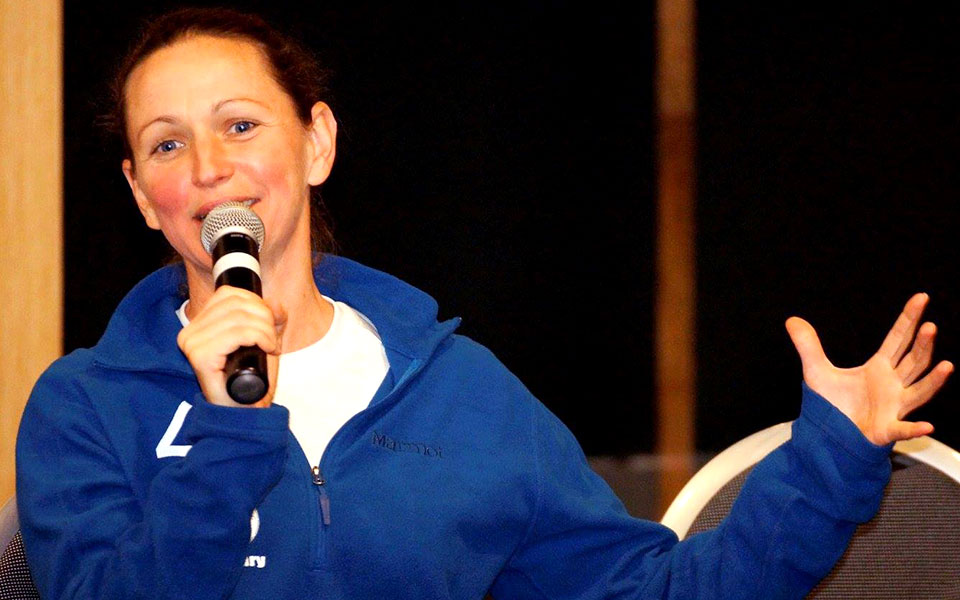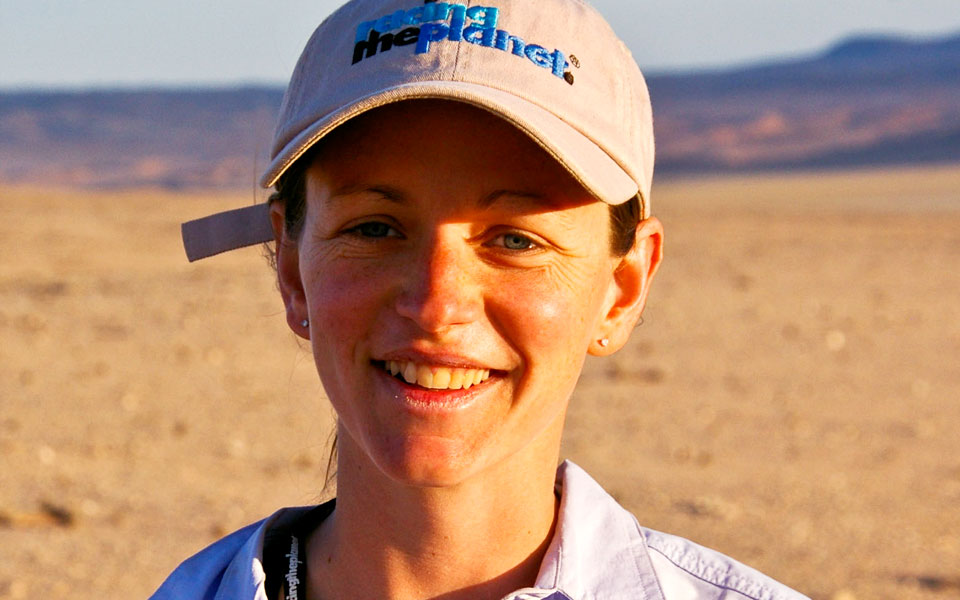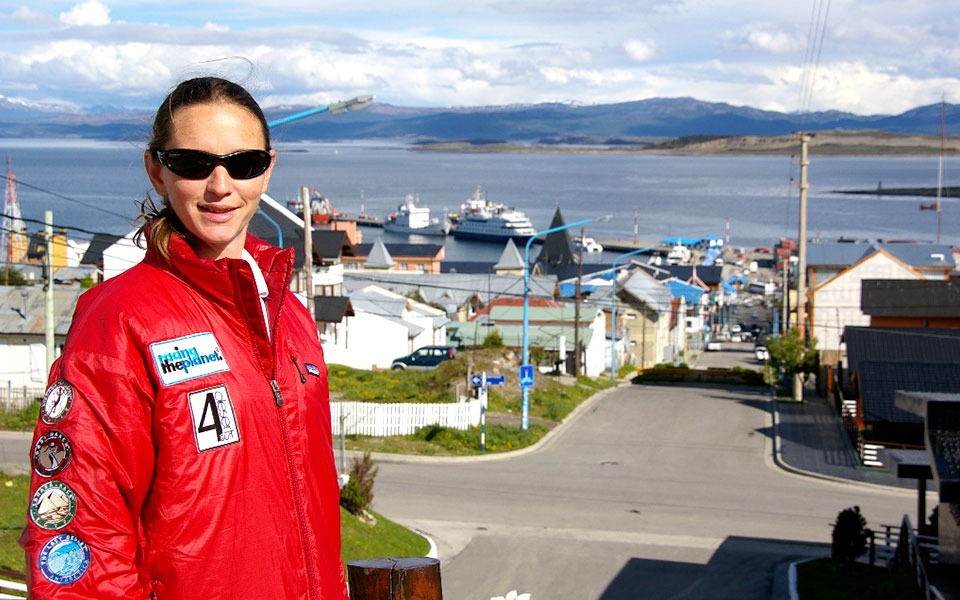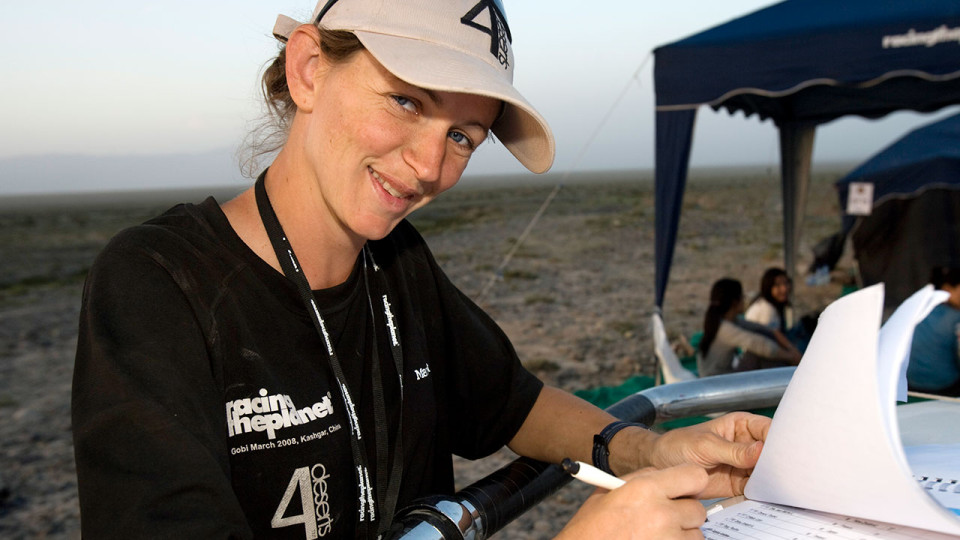The 4 Deserts Races are the world’s most prestigious staged ultra series in the world, consisting of North Africa’s Sahara Race, China’s Gobi March, Chile’s Atacama Crossing and Antarctica’s Last Desert. Those adventurous enough to participate travel 250 kilometres in seven days with zero comforts of home. Who’s in charge of staging these fantastic events? A citizen of the world named Samantha Fanshawe. Her background, education and unabashed devotion to ultras uniquely qualify her for her job, but to Sam, it’s all in a day’s work.
RS: You recently attended a Singapore runner’s convention. What did you think about it?
Sam: Singapore is an excellent example of how the global running trend has exploded. I was delighted to meet enthusiastic Singaporean runners in small groups and individually, including Lizzie Hawker and Ricky Lightfoot, two phenomenal members of this running community. Attendees had unprecedented access to professional advice from experts, learning just how far running can take them—literally and figuratively!

RS: What made you fall in love with extreme rather than regular long-distance running?
Sam: Well, I’m not a fast runner and I love to travel, so the opportunity to do both is irresistible. A volunteer experience at the 2005 Gobi March introduced me to the wonders of extreme racing and I was hooked immediately. I like the idea of running long distances in new places where landscapes are stunning. The harshness, beauty and solitude of exotic locations is breathtaking.
RS: Your first ultra experience was as a volunteer at the Gobi March. Do you recommend volunteering to those who are interested in ultras?
Sam: I do—but I always emphasise the hard work, long hours, deprivation and primitive circumstances they can expect. Sleeping in a tent and going without showers for a week didn’t discourage me, but some may not like it, so volunteering is a great way to be exposed to these types of events.
RS: Can you share more about your role and responsibilities as President of Events?
Sam: I set up logistics so the courses we pick are stunning, varied and safe. I oversee everything from ensuring that we have enough zip ties and pink flags to mark the course and water to negotiating the price of camels and creating risk assessment and contingency plans for every possible situation we encounter. My biggest job is thinking on my feet but I don’t do any of this alone! Our permanent staff at 4 Deserts headquarters is small, but when we staff up for the events, we are a team of 60+ people.
RS: There are many deserts, yet 4 Deserts focuses on Antarctica, Sahara, Gobi and Atacama Desert. Why is that?
Sam: That has to do with “extremes”. These are the hottest, coldest, windiest and driest deserts in the world, but we always remain flexible on these four locations to ensure the safety of participants. For example, with instability in North Africa and the Middle East, we’re moving next year’s Sahara Race and we’ll announce that location soon.
RS: Given the demands made on you, do you still race competitively? When was your last competitive race?
Sam: I still race, but I don’t compete. I run in Hong Kong and other Asia locations, preferring events that range from 20km to 50km. I did the HK100 this year and a 120km race in Italy. And yes, I was a Gobi March competitor and loved every minute.
RS: What are your running goals and proudest accomplishments? Do you keep track of your races?
Sam: My running goals are simple: stay fit, find new trails and discover new places. I don’t keep track of races. My biggest accomplishment thus far is the Gobi (250km). The longest single staged race (120km) I ran was in Italy last year and my first major ultra was the Trailwalker in Hong Kong in 2007. What surprises people is that I have only run one “conventional” road marathon in Singapore, and that was back in 2005!
RS: What about new races? Are there any you would love to run?
Sam: There are too many races to choose from these days! I’d like to do a 100-mile race, particularly the UTMF, but I’ll save that for a time when I can train properly and focus completely on the race. Italy’s Tor de Geants is another event I have my eye on, but serious training is needed before I toe the start line, too. I would also love to do a full Ironman.
RS: What safety advice do you give 4 Deserts participants and how do you make sure everyone is cared for during their time in the desert?
Sam: I stress the importance of prioritising one’s own safety and being mindful of obstacles, slippery paths, etc. I also emphasise carrying enough water to avoid dehydration between fill-up points. A head torch for night running is really helpful and I urge participants to remain aware of weather conditions so suitable gear and supplies—e.g., sunscreen, hat, waterproof jacket—are brought along. I advise them that being self-aware—listening to your body and responding accordingly—can mean the difference between finishing strong and not finishing. Runners receive excellent care from medical staff and volunteers.

RS: Do you see to the medical and supply needs of competitors?
Sam: We make sure everyone receives a comprehensive equipment list, which is checked pre-race, and we take a fairly extensive history of each person’s medical history, medications, race experience and training distances. We require certificates signed by medical doctors who are advised up front of the race’s extreme conditions.
RS: What about injuries and accidents?
Sam: We minimise the amount of time and distance competitors travel unsupervised. They’re monitored continually; we roam the course in vehicles and on foot. Our qualified, experienced U. S. medical team also traverses the course with a full complement of medical supplies for emergencies. 4 Deserts are non-technical ultras, but if there are unusual obstacles (e.g., a narrow canyon, steep climb or descent), we place people at these points beforehand to guide and assist runners so they don’t get hurt.
RS: Some runners are unfamiliar with “stage ultras”. What do you tell them?
Sam: I tell them that rather than getting from A to B and going home, they can expect to sleep in tents overnight and during down time, rest and relax. Getting to know other runners is the best part of stage ultras. The camaraderie is indescribable. I encourage runners to try one because they rarely require pre-requisites so we attract lots people who haven’t run a single marathon. Which one? Base your decision on where you want to travel, then match up dates. Some do it in reverse: they check dates and then pick locations.
RS: What about training and preparation? Can you give readers pointers?
Sam: I can: Give yourself three to six months to prepare if you already have a base fitness level, and then start putting in the time. I recommend achieving these six goals before you get to the start line:
- Complete a minimum of 50 kilometres per week for three to six months.
- Undertake a minimum of 50 kilometres in one go at least once.
- Participate in back-to-back (consecutive days) training of at least 30 kilometres daily.
- Consistently carry a 10-kilogram backpack throughout training.
- Know what electrolytes your body needs and which types/flavours you prefer.
- Break in your kit while training—shoes, backpack, hydration system, food and drinks.
RS: Ultras are gaining popularity in Southeast Asia. Will 4 Deserts organise more?
Sam: (Laughs) Well, we are the 4 “Deserts” and there are not many deserts in Southeast Asia! On a serious note, we’ll stick to the existing ultras for now, but our Roving Race Series, which uses the same format as the 4 Deserts (250km, 6-stages, 7-days), moves to different locations annually and not necessarily in a desert. The inaugural Roving Race was held in Vietnam in 2008 and in Nepal in 2011. It’s time to bring it back to Asia. Our 2016 location announcement will come soon!

RS: What new races can we expect in the future?
Sam: 2016 is shaping up to be busy. We are partnering with short race organisers in Asia. These make excellent training experiences for the 4 Deserts. The first is the Korea 50k, staged just an hour from Seoul, on 10 May 2015.
RS: What are your goals and resolutions for yourself and 4 Deserts for the rest of 2015?
Sam: Gosh, that is a tough question. I want to improve the 4 Deserts Races; emphasise website coverage and better tracking in real time, plus enhanced social social media linkage. We’re excited to sponsor the first-ever Afghanistan ultramarathon team for the Gobi and we hope to enable a sight-impaired competitor to participate unguided! As for my personal goals, they remain inexorably tied to the 4 Deserts Race Series for the moment!
Samantha Fanshawe lives and breathes the 4 Deserts, and her excitement over the world’s first Afghanistan team shows how much sports brings the world together. Her mission is unmistakable and her dedication is admirable. Have you ever felt this way about your career—love it so much, salary is secondary to the satisfaction you gain every day? Inspire us! Tell us how your job has changed your life.




